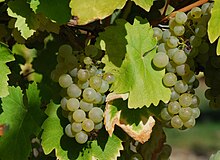Chalot
| Folle Blanche | |
|---|---|
| Grape (Vitis) | |

Folle blanche grapes
|
|
| Color of berry skin | Blanc |
| Species | Vitis vinifera |
| Also called | see list of synonyms |
| Origin | France |
| Notable regions | Western Loire (Pays Nantais) |
| Notable wines | Gros Plant du Pays Nantais |
Folle blanche was the traditional grape variety of the Cognac and Armagnac regions of France. It is also known as Picpoule (with various variations of spelling (Piquepoul, Picpoul), although it is in fact unrelated to the Picpoul of the Languedoc) as well as Gros Plant and Enrageat blanc. Folle blanche is an offspring of Gouais blanc, with the other parent so far unidentified.
It has been mostly replaced by its hybrid offspring Baco blanc due to phylloxera damage. Baco blanc (also known as Baco 22 A) is a cross of Folle blanche and the Vitis riparia × Vitis labrusca hybrid Noah. Folle blanche is also the parent of the very hardy and disease-resistant Baco 1 (or Baco noir), a cross of Folle blanche and a Vitis riparia variety. Baco noir and Baco 22 A, like Folle blanche and their other parents, produce a very acid wine. This makes them more suited to distillation than less acidic grapes.
Folle blanche is used in the Loire Valley area and in Brittany around Nantes to produce Gros Plant du Pays Nantais, a very dry and often tartly acidic wine that pairs well with shellfish. There it is used both in the production of table wine as well as eau de vie.
The first recorded mentioning of Folle blanche was in 1696 when the grape was documented as one of the varieties growing in the Charente-Maritime department. Here the grape has had a long history being used in the production of Cognac and Armagnac. The name Folle is a feminine derivative of the French word fou which means "mad" with ampelographers speculating that this could be a reference to the grapevine's tendency to being highly productive and grow vigorously where ever it is planted. Several of Folle blanche's synonyms also seems to make similar allusions such as Gros Plant ("big vine") which was first used for the grape in 1732 in the Loire-Atlantique department and Enrageat (from the French enragé) that has been a common synonym for Folle blanche in Southwest France since at least 1736.
...
Wikipedia
